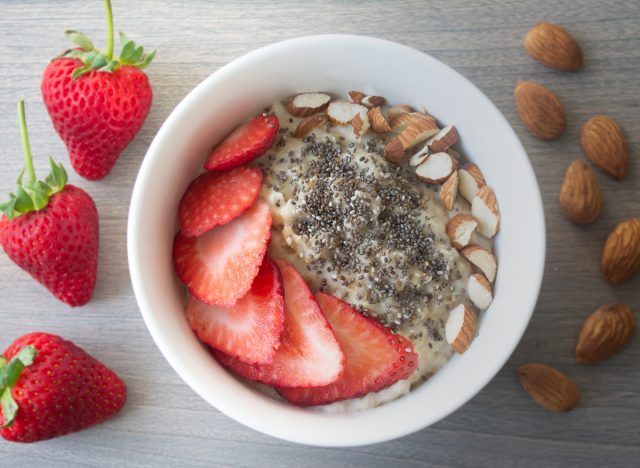7 Ways To Lower Your Cortisol Levels and Destress Instantly, According to Experts

When it comes to cortisol, you likely associate it with stress and packing on unwanted pounds. What you may not have known is that the cortisol hormone is something your body naturally produces—it’s also key in helping you get a handle on your blood sugar, preserve blood pressure, and make sure your metabolism is functioning properly. We spoke with members of our Medical Expert Board, The Nutrition Twins®, Tammy Lakatos Shames, RD, CDN, CFT, and Lyssie Lakatos, RD, CDN, CFT, who break down seven ways to lower your cortisol levels to keep the stress and excess pounds at bay, so listen up.
Internal and external factors may bring about a boost in cortisol release, such as acute stress, psychological stress, chronic stress, and physical stress. Normally, your cortisol levels are the highest first thing when you wake up and slowly decrease during the day, until they’re at their lowest in the evening. Read on to learn about the easy ways to lower your cortisol levels. And when you’re finished, don’t miss the 4 Best Vitamins for Women To Start Taking Before Turning 40.
Don’t have sugar in the morning.

It’s so easy to pick up a breakfast pastry when you’re on the go in the morning, but know that carbs are digested fast. That’s especially true when it comes to simple carbohydrates such as refined white, doughy carbs and sugar-packed treats, which cause a spike in your blood sugar.
“When blood sugar spikes, it is followed by a crash, triggering the release of neurotransmitters, including cortisol, aka the belly fat hormone,” The Nutrition Twins explain. “Not only does this stress your body and set you up for blood sugar swings and excess cortisol for the day, but it triggers inflammation. The more inflammation in your body, the more cortisol is produced—AND the harder it is to lose weight. It’s a vicious cycle. All of this is trouble for your calm body and for your weight. That’s why it’s a good idea to avoid naked carbs for breakfast too.”
Incorporate 20 grams of protein into each meal.

Your goal should be to incorporate 20 grams of protein into your meals. Enjoy your protein with small portions of wholesome carbs that are high in fiber and give you a solid energy boost.
“The slow-digesting protein stabilizes blood sugar, keeping you on an even keel and preventing energy crashes and blood sugar dips that trigger cortisol release (and that set you up for weight gain and poor blood sugar control),” The Nutrition Twins tell us. “You can get 20 grams of protein (or more) in three ounces of fish or chicken breast, one cup of Greek yogurt, roughly ¾ cup egg whites, and six ounces of light tofu.”
Additionally, you can easily work protein into your workout shakes by mixing up your favorite protein powder with fresh fruit and almond milk, or kick off the day with a protein-packed nut butter oatmeal recipe. The possibilities are endless!
Place your legs up on a wall for 10 minutes before having dinner.

Placing your legs up on a wall before having dinner may sound like an interesting tip. Doing so has some of the same benefits as other yoga poses, such as it helps lower your stress and cortisol levels. Plus, it’s a quick and easy way to relax. The Nutrition Twins recommend covering your eyes while you do this exercise, and this “cortisol reset” will help you alleviate any stress so you don’t bring it into dinnertime.
“The benefit we’ve seen in our clients is improved blood sugar control (even if they don’t have diabetes); stable blood sugar means lower cortisol levels, which in turn helps our clients to sleep through the night without blood sugar and or/cortisol swings waking them,” they explain. “To do this, simply lie on your back and place your legs up on the wall, so they are elevated. Ideally, your body is in the shape of an ‘L,’ and cover your eyes for 10 minutes. Cortisol lowering bonus points: Deep breathe as you relax.”
RELATED: The #1 Yoga Exercise Incredibly Fit People Do, Says Expert
Hum while you’re in the shower.

Humming in the shower activates your parasympathetic nervous system, helping you feel relaxed and calm your “fight or flight mode.” In fact, The Nutrition Twins tell us, “Research has found that humming is very effective for reducing stress when looking at several heart rate variability factors. By humming every time you shower, it will help you to create a daily habit that can slow your heart rate, reduce anxiety, and lower cortisol.”
Add more magnesium-packed foods to your diet.

Adding more foods that are rich in magnesium is a surefire way to boost your quality of sleep, lower anxiety, and help decrease cortisol. “Magnesium diminishes our body’s stress response,” The Nutrition Twins say. “But our body readily uses magnesium when we’re stressed, and most of us are deficient in it. Good sources of magnesium include pumpkin and chia seeds, almonds, spinach, cashews, rolled oats, beans, peanuts, and soymilk.”
Use an eye mask when you sleep.

Put on an eye mask before you drift into Dreamland. If your room is too light, you can totally mess up the amount of restorative sleep you get, which means higher cortisol levels.
“While you may think that having your eyes closed is enough to block light in a seemingly darkish room, even small amounts of light easily get through a closed eyelid and don’t allow the brain to fully restore itself during sleep,” The Nutrition Twins explain. “Simply covering your eyes can be a game changer for cortisol levels.”
Try ashwagandha.

Last but not least, one of the easiest ways to lower your cortisol levels is by considering the “cortisol-lowering adaptogen,” ashwagandha. “Ashwagandha helps control mediators of stress, like cortisol, relaxing and calming the body by working with the body’s parasympathetic nervous system … It’s been shown to improve sleep and memory, as well as reduce blood sugar levels and inflammation. Take it consistently to see the effects,” The Nutrition Twins say. They think of it as the OG “chill pill.”









